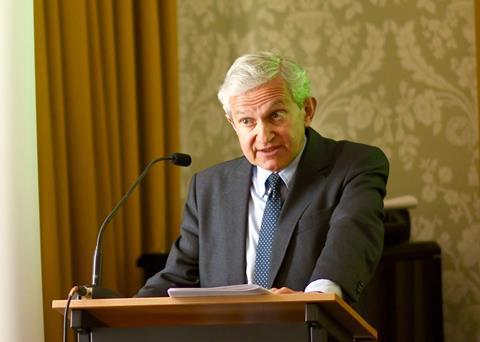Commercial litigation and arbitration need to change ‘a lot’ if London is to remain a leading dispute resolution hub amid intensifying competition, the master of the rolls said this week. Sir Geoffrey Vos urged lawyers to embrace digital innovation and artificial intelligence to cuts costs and expedite cases.
Vos was speaking on Wednesday at Lincolns Inn, where he delivered the McNair Lecture honouring the contribution of Lord Arnold McNair to the development of international law. His theme was the challenges facing London as a leading dispute resolution centre.
‘Cases in arbitration and in the Business and Property Courts are not taking any less time to resolve now than they did 20 years ago,’ he said. ‘That is despite active case management, restrictions on disclosure and on the length of witness statements and other streamlining techniques. The use of video conferencing technology is not a panacea, nor is automated disclosure. We need to re-think the process for the digital age. In doing so, we will want to be sure, of course, that we do not throw the baby out with the bath water.’

The utility and necessity of pleadings, expert reports and witness statements all need to be considered afresh, said Vos: ‘They are each analogue concepts rooted in an analogue age, which may be in need of a digital makeover.’
The master of the rolls believes generative AI may help in identifying the real issues that divide parties. ‘If that could be done, the actual resolution process itself could become shorter and less costly, particularly if on-chain recording [where transactions are verified on the blockchain] meant that the scope for factual disputes was much reduced.’
Technology should ensure every case has a single data set to avoid duplication and extra cost across all forms of dispute resolution, he added.
Vos also predicted that GPT-4 and other advanced machine learning will transform the work lawyers do - and possibly even the business of judging. ‘AI may, at some stage, be used to take some (at first, very minor) decisions. The controls that will be required are (a) for the parties to know what decisions are taken by judges and what by machines, and (b) for there always to be the option of an appeal to a human judge.
‘In the commercial field, the controls that will be necessary on automated decision-making will rapidly become very complex indeed.’
He concluded: ’These technologies will transform both the disputes that will need to be resolved, and the way commercial people will need to have them resolved. As I sometimes say, we will all have to get with the programme!’



























12 Readers' comments